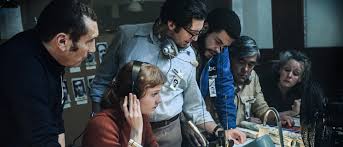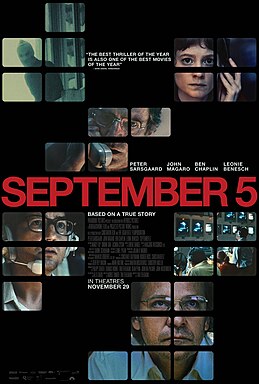Eye For Film >> Movies >> September 5 (2024) Film Review
September 5
Reviewed by: Marko Stojiljkovic

The sports results and the names of the medal-winners from 1972 Olympics that took place in Munich are by now largely forgotten outside the circle of the most avid pub-quizzers. Maybe with a noble exception of Mark Spitz’ then-record tally of 7 gold medals in swimming – that one is something an average pub-quiz-frequenter should know. However, the event was marked by at least three things other than sports: the fact that the Games presented the chance for Germany to show its new, tolerant post-war face; the Black September attacks on Israeli athletes; and a technological advance – the 1972 Munich Olympics was the first event that was televised from one continent to another in real time, using satellite connection.
Coming from the Swiss director Tim Fehlbaum of The Tides (2021) infamy, and realised by German producers, September 5 touches all three of the mentioned angles in a unique, more or less successful way. After the première at Venice and the tour of festivals with the special accent on the American ones, September 5 was also shown at Black Nights in Tallinn as a part of the German cinema focus programme.
The plot of the main event is well known and completely clear: early in the morning on September 5, the Black September Palestinian terrorists managed to infiltrate the building in the Olympic village where the Israeli athletes and their coaches stayed, to attack two apartments, kill one person, mortally wound another and take 11 more people as hostages. They demanded the release of some 200 Palestinian prisoners from Israeli facilities, threatening to execute one hostage per hour if their demands were not met. The reaction from the German police and the state was mild and ill-advised and ended up with a massacre in which all 11 hostages, along with five of the attackers, were killed at a nearby military airport after a failed attempt at intervention by the police or at escape by the hostages themselves.
The thing is, we know that because we saw it live on television thanks to the people who were present on the ground in Munich, in the Olympic Village, reporting live from the place. The lesser known thing about the coverage of the hostage situation is the fact that it was done predominantly by specialised sports journalists who had little to no experience covering such situations, let alone transmitting the whole thing live to the American audience via satellite and negotiating deadlines with the corporate heads. September 5 is a film about them and their effort.
John Magaro stars as Geoffrey Mason, the live TV director who was the shift leader when the attack happened so had to deal with the resulting situations, both ethical and practical, as well as make decisions in an instant. Ben Chaplin and Peter Sarsgaard play his direct superior Marvin Bader and the big boss Roon Arledge, while Benjamin Walker plays the TV presenter Peter Jennings who presented the findings by the back room crew of journalists and technicians to the info-hungry global audience. And playing the translator, Marianne Gebhard, who gets more and more tasks as the film goes on, on the grounds of being the only person fluent in German and with some connections in German media, Leonie Benesch simply shines.
Even she cannot fill the blanks in a script that teases the audience with a socially charged angle on how Germans reacted to the trauma of Jewish people being killed again on their watch, but fails to develop it in depth. But being apolitical suits the filmmaker's ambition, giving the events a specific behind-the-scenes point of view, focusing on the work and the responsibilities of the journalists who had to cover it. In that regard, September 5 becomes a love letter to the work on television under pressure of live reporting. The stylistic approach, aimed at capturing the style of the Seventies with regard to light and granulation, putting emphasis on the cinema vérité and direct cinema 'schools' of the epoch with hand-held camerawork, some sharp panning shots and pace-building editing, also serves both the material and the point of view very well.
In the end, September 5 might not be a masterpiece, but it is a tense, nail-biting thriller and a viewing experience worth watching. Good in terms of production values, with a star-studded cast and the appeal of the American minor A-production in the docudrama sub-genre, it might travel the world from festivals to cinema repertoires to streamers and cable TV.
Reviewed on: 17 Nov 2024

















